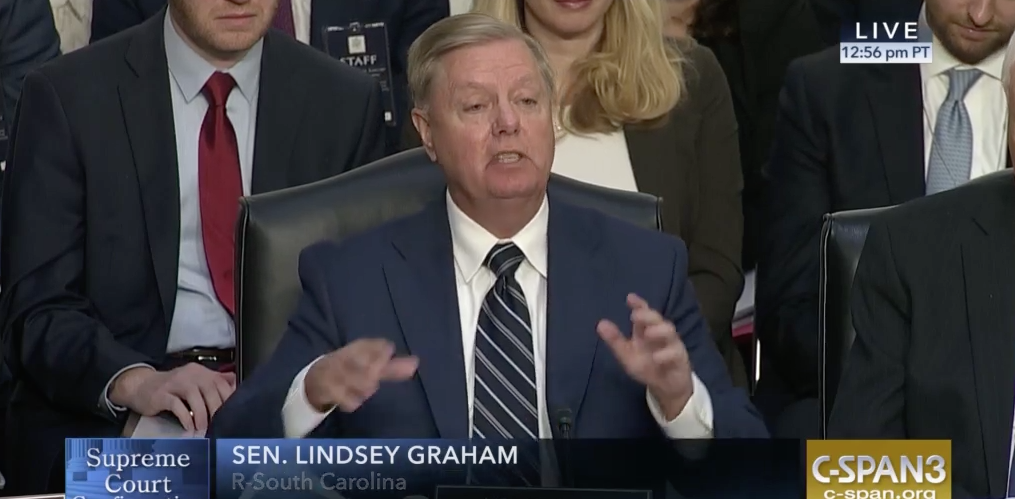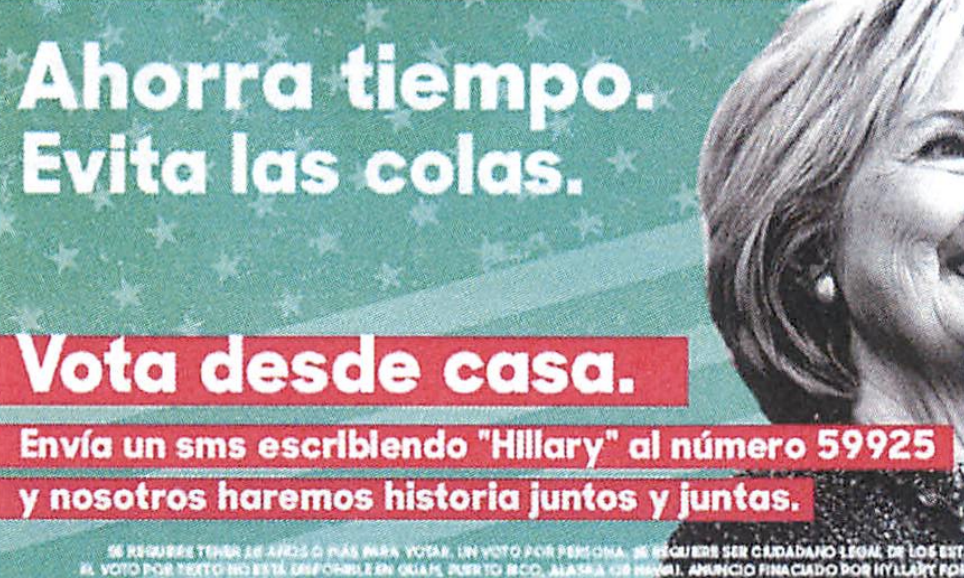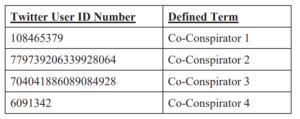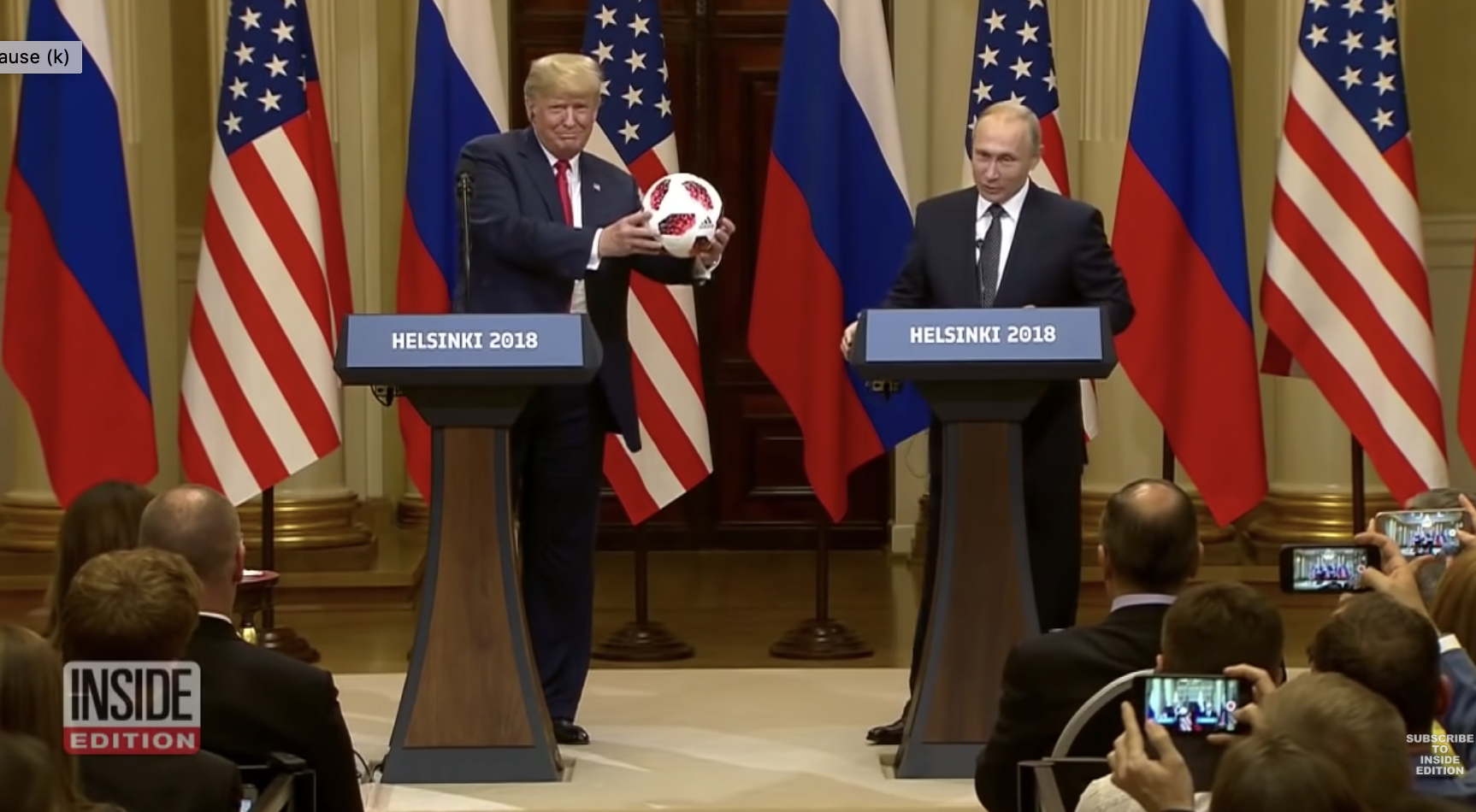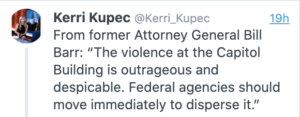I’d like to return to Judge Emmet Sullivan’s opinion dismissing the Mike Flynn case. This post was written at the time of the opinion.
As I noted at the time, Sullivan did several things in conjunction with the opinion.

The first thing he did was to strike some documents which the government had not authenticated in response to his order that they do so. That may be mere housekeeping, but at a time when it was effectively too late for the government to try to withdraw any of the other documents, it left those exhibits it had authenticated — with at times dodgy claims of authentication and in one case no claim (some Lisa Page and Peter Strzok texts, a significant portion of which were entirely off-topic, which the government admitted it had submitted for shits and giggles) — in his docket.
Then, he issued his order. In it, he granted one of the government’s two requests, to dismiss the case as moot. But in the same order, he denied the government’s motion to dismiss pursuant to Rule 48(a), denying it as moot.

This step may have more significance that most at first realized. That’s because by mooting DOJ’s effort to dismiss the prosecution pursuant to Rule 48(a), Sullivan refused to sanction the effort DOJ had been pursuing since May to undo the Flynn prosecution.
Once Sullivan issued the order mooting the case, DOJ was left with very little ground to further intervene, not least because they themselves declared the case moot.
Then Sullivan issued his opinion explaining how the case became moot. As I noted at the time, in the opinion he:
- Affirmed the authority of a District Court to review whether a motion to dismiss serves the public good (but stopped short of doing so on mootness grounds)
- Laid out evidence that the motion to dismiss was pretextual and corrupt (but stopped short of making that finding on mootness grounds)
- Along the way, made judicial findings of fact regarding the propriety of the Mike Flynn investigation; effectively this was a ruling that the new reality Bill Barr attempted to create in Sullivan’s docket did not replace the prior reality DOJ had presented
I’ll elaborate on that below.
After having issued his opinion, Sullivan then denied as moot a number of other pending requests. With that order he mooted:
- The government’s request that Flynn get a downward departure on sentencing
- Flynn’s request to withdraw his guilty plea
- Flynn’s request to dismiss the case based on a claim of prosecutorial misconduct
- A Flynn request to force Covington & Burling to turn over an expansive set of documents, including their own internal discussions about ethics or about the case itself
- A Flynn request to withdraw those three earlier requests
- A really belated Flynn demand that Sullivan recuse from the case
- Amicus John Gleeson’s request for clarification about what should happen given Flynn’s petition for a writ of mandamus
- Flynn’s demand that Judge Sullivan strike the communications from Peter Strzok and Andrew McCabe about the alterations made to their documents submitted in the docket
Mostly, this is housekeeping, the mooting of all pending issues in the case. Except it has the effect of removing any claim that Flynn might have an interest in Sullivan’s recusal. Indeed, that’s a step Sullivan noted explicitly in the opinion.
In that motion Mr. Flynn requested, among other things, that the Court grant the government’s motion to dismiss pursuant to Rule 48(a) and that, upon dismissal of the case, the Court recuse itself from further proceedings. After the Court dismisses the case as moot pursuant to the presidential pardon, the Court will deny the motion for recusal as moot.
By mooting the motion to strike, Sullivan similarly moved any claim Flynn had in the Strzok and McCabe interventions going forward.
Of particular interest, that means that not only do DOJ’s dubiously authenticated documents remain before Sullivan, but so does the correspondence from Strzok and McCabe making it clear that their documents were altered (though their assertions that Jocelyn Ballantine lied to the court are not in the docket).
To sum up then: DOJ’s altered documents and evidence that they were altered remains before Sullivan, and any interest that DOJ or Flynn have in this docket — including a claim that Sullivan is biased and so must recuse — has been officially mooted.
With that background laid out, I want to look at a few more things that Sullivan did with his order.
- Reaffirmed Flynn’s guilt as a legal question
- Laid out the President’s interest in the pardon
- Set the operative time of Flynn’s pardon
- Did not address Flynn’s false statements before him
- Observed the scope of the pardon but agreed that it covered Flynn’s false statements crime
Reaffirmed Flynn’s guilt as a legal question
First, Sullivan made it clear in several different ways that Flynn’s guilty verdict remains.
In the section laying out the posture of the case, Sullivan described how Flynn pled guilty twice.
Under oath and with the advice of counsel, Mr. Flynn pled guilty to the crime on December 1, 2017.
[snip]
On November 30, 2017, Mr. Flynn entered into a plea agreement with the government upon the advice of counsel. See Plea Agreement, ECF No. 3 at 10. Judge Rudolph Contreras accepted Mr. Flynn’s guilty plea on December 1, 2017, finding that Mr. Flynn entered the plea knowingly, voluntarily, and intelligently with the advice of counsel.
[snip]
On December 18, 2018, this Court accepted Mr. Flynn’s guilty plea a second time. Sentencing Hr’g Tr., ECF No. 103 at 5, 16. During that hearing, the Court extended the plea colloquy in view of Mr. Flynn’s statements in his sentencing memorandum, which raised questions as to whether Mr. Flynn sought to challenge the conditions of the FBI interview. See generally Def.’s Mem. in Aid of Sentencing, ECF No. 50 at 6-18. Under oath, Mr. Flynn confirmed that his rights were not violated as a result of the circumstances of his January 24, 2017 FBI interview and the allegations of misconduct against FBI officials. Id. at 11-12. And Mr. Flynn declined the Court’s invitation for the appointment of independent counsel to advise him. Id. at 9-10.
He also noted that when Flynn moved to dismiss his guilty plea, DOJ never got as far as responding (he doesn’t note that, rather than doing so, they moved to dismiss the prosecution).
The government did not file a response to Mr. Flynn’s motions to withdraw his guilty pleas due to its incomplete review of Mr. Flynn’s former counsel’s productions relevant to Mr. Flynn’s claims of ineffective assistance of counsel, as well as a dispute between Mr. Flynn and his former counsel.
Then, in the section on the legal status of a pardon, Sullivan emphasized that accepting a pardon may be an admission of guilt. Note the emphasis is Judge Sullivan’s.
On the other hand, a pardon does not necessarily render “innocent” a defendant of any alleged violation of the law. Indeed, the Supreme Court has recognized that the acceptance of a pardon implies a “confession” of guilt. See Burdick, 236 U.S. at 94 (“[A pardon] carries an imputation of guilt; acceptance a confession of it.”); see also United States v. Schaffer, 240 F.3d 35, 38 (D.C. Cir. 2001) (“[A]cceptance of a pardon may imply a confession of guilt.” (citing In re North, 62 F.3d 1434, 1437 (D.C. Cir. 1994)). As Chief Justice Marshall wrote, “[a] pardon is an act of grace, proceeding from the power intrusted with the execution of the laws, which exempts the individual on whom it is bestowed, from the punishment the law inflicts for a crime he has committed.” United States v. Wilson, 32 U.S. 150, 150 (1833) (emphasis added). In other words, “a pardon does not blot out guilt or expunge a judgment of conviction.” In re North, 62 F.3d at 1437. Furthermore, a pardon cannot “erase a judgment of conviction, or its underlying legal and factual findings.” Arpaio, 2017 WL 4839072, at *1 (citing United States v. Crowell, 374 F.3d 790, 794 (9th Cir. 2004)); but see Schaffer, 240 F.3d at 38 (vacating “all opinions, judgments, and verdicts of this court and the District Court” where “[f]inality was never reached on the legal question of [the defendant’s] guilt” (emphasis added)).
After citing the Arpaio precedent, where the corrupt sheriff tried to expunge his guilty status, Sullivan then cited the Schaffer precedent in the DC Circuit treating the question of a defendant’s guilt as a legal question, not a political one. Sullivan added emphasis to four things in this opinion. Two of them, appearing in this passage, focus on two circumstances that mean Flynn is still guilty of his crimes. By giving Flynn a pardon, Trump excused the consequences for his crimes, but he didn’t change the legal fact that Flynn was guilty, and Flynn’s own acceptance of the pardon imputes that he committed the crime.
Note, I don’t think Sullivan was making a general comment about pardons generally (and I also think it a mistake to read his citation to Burdick as a general comment about accepting pardons amounting to an admission of guilty; he instead seems to be saying it might be). He was making a comment about this one, the legal question before him. Sullivan issued a ruling, then, that circuit and Supreme Court precedent mean that Flynn’s guilty verdict remains and that by accepting a pardon, he confessed to his guilt.
Laid out Trump’s interest in the pardon
Before the sections in which Sullivan analyzes why DOJ’s claims in moving to dismiss the prosecution are bunk, Sullivan first described how interested Trump was in Flynn’s prosecution. Along the way, he notes Sidney Powell’s admission at a September hearing that she had spoken with Trump and asked Trump not to pardon Flynn.
For example, Mr. Flynn was serving as an adviser to President Trump’s transition team during the events that gave rise to the conviction here, and, as this case has progressed, President Trump has not hidden the extent of his interest in this case. According to Mr. Gleeson, between March 2017 and June 2020, President Trump tweeted or retweeted about Mr. Flynn “at least 100 times.” Amicus Br., ECF No. 225 at 66. This commentary has “made clear that the President has been closely following the proceedings, is personally invested in ensuring that [Mr.] Flynn’s prosecution ends, and has deep animosity toward those who investigated and prosecuted [Mr.] Flynn.” Id.
At the September 29, 2020 motion hearing, Mr. Flynn’s counsel, in response to the Court’s question, stated that she had, within weeks of the proceeding, provided the President with a brief update on the status of the litigation. Hr’g Tr., ECF No. 266 at 56:18-20. Counsel further stated that she requested that the President not issue a pardon. Id. at 56:23-24. However, the President has now pardoned Mr. Flynn for the actions that instigated this case, among other things. Ex. 1 to Consent Mot. Dismiss, ECF No. 308-1 at 1. And simultaneous to the President’s “running commentary,” many of the President’s remarks have also been viewed as suggesting a breakdown in the “traditional independence of the Justice Department from the President.” See, e.g., Amicus Br., ECF No. 225 at 67-68; id. at 68 (quoting Excerpts from Trump’s Interview with the Times, N.Y. Times (Dec. 28, 2017), https://www.nytimes.com/2017/12/28/us/politics/trumpinterview-excerpts.html) (reporting President Trump’s statement that he enjoys the “absolute right to do what I want to do with the Justice Department”).
Given this context, the new legal positions the government took in its Rule 48(a) motion and at the motion hearing raise questions regarding its motives in moving to dismiss.
That is, it was in light of Trump’s claimed “absolute right to do what [he wants with DOJ],” that Sullivan reviewed DOJ’s claimed excuses for blowing up the prosecution and found them pretextual.
Set the operative time of Flynn’s pardon
Perhaps most curiously, Sullivan went to some lengths to mark the precise time of Flynn’s pardon: November 25, 2020, at 4:08PM ET.
Rather than treating the filing of the notice of appeal or the appeal itself (the time of which is suspect) as operative, Sullivan instead treated Trump’s tweet announcing the pardon as definitive, going so far as including a legal basis to depend on Trump’s Tweets as operative.
On November 25, 2020, President Trump granted Mr. Flynn a “full and unconditional pardon” for: (1) “the charge of making false statements to Federal investigators,” in violation of 18 U.S.C. § 1001, as charged in the Information in this case; (2) “any and all possible offenses arising from the facts set forth in the Information and Statement of Offense” filed in this case “or that might arise, or be charged, claimed, or asserted, in connection with the proceedings” in this case; (3) “any and all possible offenses within the investigatory authority or jurisdiction of the Special Counsel appointed on May 17, 2017, including the initial Appointment Order No. 3915-2017 and subsequent memoranda regarding the Special Counsel’s investigatory authority”; and (4) “any and all possible offenses arising out of facts and circumstances known to, identified by, or in any manner related to the investigation of the Special Counsel, including, but not limited to, any grand jury proceedings” in this District or in the United States District Court for the Eastern District of Virginia. Ex. 1 to Consent Mot. Dismiss, ECF No. 308-1 at 1; see also Donald Trump (@realDonaldTrump), Twitter (Nov. 25, 2020, 4:08 PM), https://twitter.com/realDonaldTrump/status/1331706255212228608.6
6 The Court takes judicial notice of President Trump’s tweet as the veracity of this statement “can be accurately and readily determined from sources whose accuracy cannot reasonably be questioned.” Fed. R. Evid. 201(b)(2); see Hawaii v. Trump, 859 F.3d 741, 773 n.14 (9th Cir. 2017), vacated on other grounds, 138 S. Ct. 377 (2017).
Only after pointing to Trump’s tweet of 4:08PM on November 25, 2020 as the operative moment of Trump’s pardon of Flynn did Sullivan mention the filings in his docket as basis for the proof that Flynn had accepted the pardon.
Mr. Flynn accepted the pardon, and Mr. Flynn and the government subsequently moved to dismiss this case as moot. See Consent Mot. Dismiss, ECF No. 308 at 2.
I don’t know why Sullivan did this. But he did. He set a time — 4:08 PM ET on November 25, 2020 — when Trump’s pardon of Flynn went into effect, based on the legal authority of Trump’s Tweet, and then made it clear that after the time of the pardon, Flynn accepted it.
Did not address Flynn’s false statements before him
Almost as interesting as the way Sullivan set the precise time when Trump issued a pardon for Flynn is what Sullivan did with the lies Flynn told in his own court. As a reminder, Flynn submitted a declaration that materially conflicted with sworn statements he had made before two judges and the grand jury. When he appointed John Gleeson, Judge Sullivan asked Gleeson to review whether he should consider holding Flynn in criminal contempt. When he reviewed that in his history of the case, Sullivan stated that Gleeson had convinced him that holding Flynn in contempt would be an atypical way of dealing with the issue.
On May 13, 2020, the Court appointed John Gleeson (“Mr. Gleeson”) as amicus curiae to present arguments in opposition to the government’s Rule 48(a) motion and to address whether Mr. Flynn should be held in criminal contempt for perjury pursuant to 18 U.S.C. § 401; Federal Rule of Criminal Procedure 42; the Court’s inherent authority; and any other applicable statutes, rules, or controlling law.3
3 The Court is persuaded by the arguments presented that issuing an Order to Show Cause would amount to an atypical action and so does not address this issue in this Memorandum Opinion.
Gleeson had favored taking Flynn’s further perjury into account at sentencing, but now Sullivan won’t be sentencing Flynn. DOJ had said that the proper way to deal with such perjury is to refer it to DOJ for prosecution.
Sullivan’s language here didn’t say he’s not going to deal with Flynn’s perjury; rather, he just said he’s not dealing with it in this particular opinion.
Observed the scope of the pardon but agreed that it covered the issues in this docket
That’s important for Sullivan’s discussion of the power of Trump’s pardon. Sullivan laid out the awesome scope of the pardon power. Before he did so, though, he first laid out the power of the courts to interpret the law, including the scope of the pardon power specifically, tying the pardon power to Marbury versus Madison.
Though the Constitution confers the pardoning power on the President generally, it is well-established that “the judiciary has served as the supreme interpreter of the scope of the constitutional powers since Marbury v. Madison.” See William F. Duker, The President’s Power to Pardon: A Constitutional History, 18 Wm. & Mary L. Rev. 475, 506 (1977); see also Marbury v. Madison, 5 U.S. 137, 177 (1803) (“It is emphatically the province and duty of the judicial department to say what the law is.”).
[snip]
Thus, the Supreme Court in Marbury laid the foundation for the view that the President has a “general, unqualified grant of power to pardon offenses against the United States.” The Laura, 114 U.S. 411, 413 (1885).
Among the judgements he relies on showing the Supreme Court exercising judicial review and finding the pardon power unlimited, however, Sullivan cites language noting that pardons can only be issued after their commission.
In view of the principles set out in Marbury, the Supreme Court thereafter instructed that the President’s power to pardon is “granted without limit.” United States v. Klein, 80 U.S. 128, 147 (1871); see also Ex parte Garland, 71 U.S. 333, 380 (1866) (“This power of the President is not subject to legislative control. Congress can neither limit the effect of his pardon, nor exclude from its exercise any class of offenders.”). The “executive can reprieve or pardon all offenses after their commission, either before trial, during trial or after trial, by individuals, or by classes, conditionally or absolutely, and this without modification or regulation by Congress.” Ex parte Grossman, 267 U.S. 87, 120 (1925) (emphasis added).
This was the third of four things to which Sullivan added emphasis in his opinion — that according to Supreme Court precedent, pardons can only issue after the offense has been committed.
And that’s interesting, in an opinion that marked the exact moment when this pardon was granted, in the language Sullivan used to apply the precedent he reviews on pardons to the pardon before him.
Sullivan observed that the pardon itself is very broad, observing as I did that the pardon “purports to apply to “any and all possible offenses” that he might be charged with in the future in relation to this case and Special Counsel Mueller’s investigation.” But then Sullivan said the only decision before him was just the crime Flynn twice pled guilty to.
Here, the scope of the pardon is extraordinarily broad – it applies not only to the false statements offense to which Mr. Flynn twice pled guilty in this case, but also purports to apply to “any and all possible offenses” that he might be charged with in the future in relation to this case and Special Counsel Mueller’s investigation. Ex. 1 to Consent Mot. Dismiss, ECF No. 308-1 at 1. However, the Court need only consider the pardon insofar as it applies to the offense to which Mr. Flynn twice pled guilty in this case. Mr. Flynn has accepted President Trump’s “full and unconditional pardon.” See Consent Mot. Dismiss, ECF No. 308 at 2. The history of the Constitution, its structure, and the Supreme Court’s interpretation of the pardon power make clear that President Trump’s decision to pardon Mr. Flynn is a political decision, not a legal one. Because the law recognizes the President’s political power to pardon, the appropriate course is to dismiss this case as moot. However, the pardon “does not, standing alone, render [Mr. Flynn] innocent of the alleged violation” of 18 U.S.C. § 1001(a)(2). Schaffer, 240 F.3d at 38. Accordingly, in view of the Supreme Court’s expansive view of the presidential pardon power, the Court grants the consent motion to dismiss this case as moot. See, e.g., id. [my emphasis]
Of course, that’s not all that DOJ had asserted were before Sullivan. It had also included the Turkey FARA crimes (which were a benefit of Flynn’s guilty plea) and the lies Flynn told before Sullivan and the grand jury. This opinion is silent on the pardon’s applicability to them, even though both crimes were committed before the pardon.
The language at the end here may become important in the future. As noted above, DOJ had asked Sullivan both to dismiss the prosecution and to moot it. Sullivan did only the latter, asserting that the pardon only extends to political questions, not legal ones. Even as he made that distinction, he reemphasized that Flynn was guilty of the crime he was being pardoned for.
Whatever else he did, Sullivan made it clear that, under pressure from the President, DOJ went to some lengths to try to exonerate a guilty man.
Update, January 21: In a media lawsuit asking for the declassification of documents pertaining to Flynn’s sentencing as well as the one for his warrants, Judge Sullivan issued an order on Tuesday (the day before inauguration), for a status update on remaining sealed language to be submitted on January 26. I don’t expect much new to be declassified. There’s one passage about Flynn’s cooperation that DOJ might be able to unseal; given the focus of questions in Flynn’s early interviews, I wonder if it pertained to Flynn’s involvement in the fall 2016 Egyptian discussions that Mueller suspected ended up in a $10 million bribe, an investigation that was closed by Bill Barr since the last unsealing. But I do expect it will reveal whether Jocelyn Ballantine under whose discretion altered documents were submitted to the main Flynn docket, remains the AUSA in control of this case.
Update: This post seems rather quaint given how Mike Flynn called for martial law twice in the lead up to his QAnon followers attacking the Capitol. And as WaPo reported last night, Mike Flynn’s brother, Lieutenant General Charles Flynn, was part of the DOD call that responded slowly to deploying the National Guard as the insurgents overran the Capitol.

